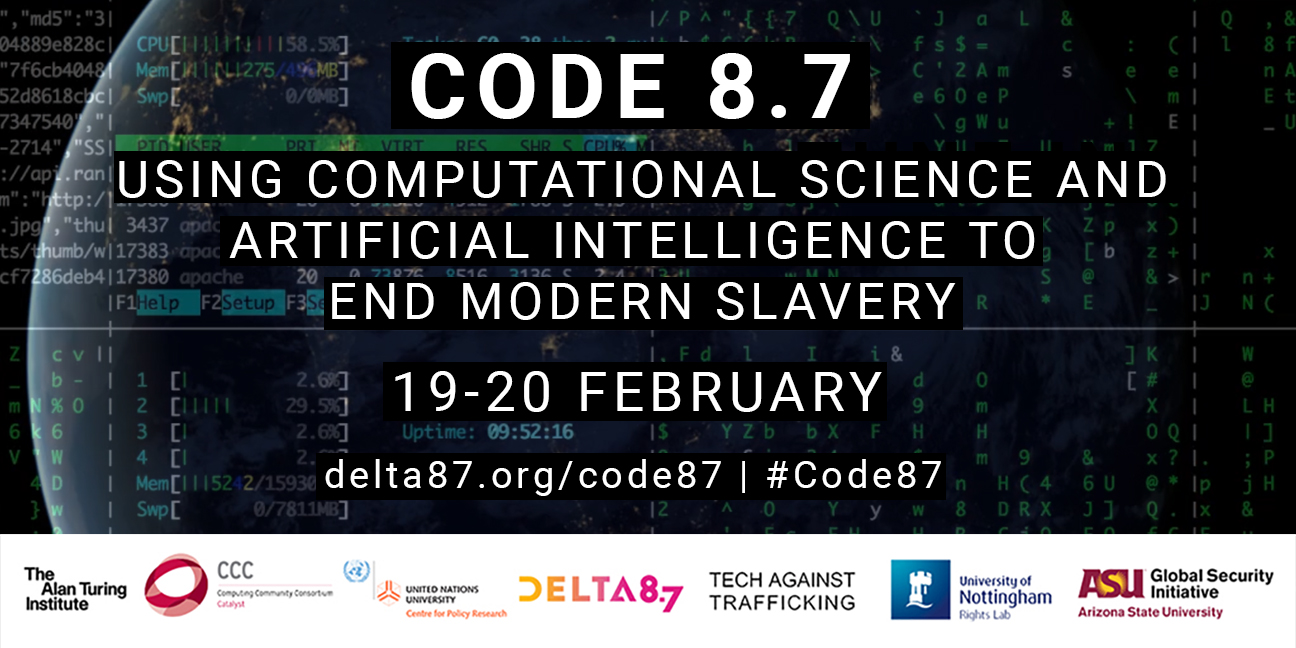
On February 19-20, 2019 the Computing Community Consortium (CCC) co-sponsored the Code 8.7: Using Computation Science and AI to End Modern Slavery with the United Nations University Centre for Policy Research, The Alan Turing Institute, Tech Against Trafficking, University of Nottingham Rights Lab, and Arizona State University Global Security Initiative.
Code 8.7 brought together computer science researchers and technologists with policy researchers, law enforcement officials, and activists involved in the fight against human trafficking. Code 8.7 was named after Target 8.7 of the Sustainable Development Goals. With Target 8.7, 193 countries agreed to take immediate and effective measures to end forced labor, modern slavery, and human trafficking by 2030, and the worst forms of child labor by 2025. Code 8.7 is an international collaboration that seeks to effect change across the globe.
Day one of the conference opened with a keynote from Kevin Bales (Rights Lab) and an opportunities showcase where six individuals – Kelly Gleason (UN University), Luis Fabiano de Assis (SmartLab Brazil), Dominique Roe-Sepowitz (Arizona State University), Doreen Boyd (Rights Lab), Harry Cook (Counter Trafficking Data Collaborative), Todd Landman (University of Nottingham), Chris Cuthbert (Lumos Fundation), and James Goulding (Rights Lab) – involved in the battle against trafficking exhibited their current work and discussed the kinds of future tools they might need to be more effective.
Among the work showcased was an analysis done by Kevin Bales on the type of language used by survivors of trafficking. He found that survivors rarely use the future tense; instead their language focuses on the past suggesting an “atemporality and aspatiality of the lived experience of slavery.” Survivors also rarely use the pronoun ‘I’, replacing it with ‘me’, indicated the view of the self as an object, not a subject.
The rest of day one was split into parallel “hothouse” sessions, with small panels that addressed potential opportunities within human trafficking that computational science could address, like vulnerability mapping and modeling, mining government data, and detecting slavery from space. CCC Council Member Nadya Bliss (Arizona State) was the moderator of one such hothouse on Using ICT (Information and communications technology) to find hidden populations. Topics discussed included what indicators are there that someone is being sex trafficked versus being a willing adult participant; approaches to sentinel surveillance, a concept taken from epidemiology to more actively track certain trends; and the DARPA Memex project that was developed to combat human trafficking through advanced online search capabilities.
Day two of the conference was focused around current challenges in the space. After a recap of the previous day’s hothouses there were three plenary discussions:
- “Towards a pipeline – Technology, Techniques and Training”, which featured Nadya Bliss as the discussant.
- “Creating incentives for action – Research, Regulation and Rewards,” including CCC Council Members Keith Marzullo (University of Maryland) to discuss the role of government and academia, and Dan Lopresti (Lehigh University), who shared the challenges to developing a shared research agenda.
- “How can we advance collaborative problem-solving?” an open discussion amongst all the participants to assess how collaborative problem-solving involving computational science can accelerate progress towards Target 8.7.
This initial meeting was a great convening of many stakeholders who can make a difference to end modern slavery. The CCC is continuing to work with Code 8.7 to develop a research agenda that will help to have a major impact on combating modern slavery.
Learn more about Code 8.7 and the fight against human trafficking on the Delta 8.7 webpage. Video from the entire conference is available for streaming at the links below:
- Day 1: Delta 8.7 Facebook page
- Day 2 AM: UN Web TV
- Day 2 PM: UN Web TV
Stay tuned to the blog for a podcast on the topic and future work in this area.









